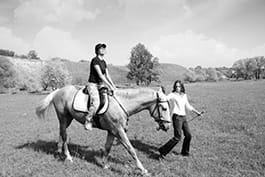Profession horse riding instructor

Horse riding instructors teach people of all ages, levels of ability and experience to ride horses.
Would you like to know what kind of career and professions suit you best? Take our free Holland code career test and find out.
Personality Type
Tasks horse riding instructor
- Plan and organize horse riding practice sessions for groups or individuals.
- Develop training programmes suited to individual riders and groups.
- Conduct practice sessions to teach horse riding and related activities to groups or individuals, making sure that training is carried out safely.
- Give practical demonstrations of riding activities.
- Observe riders in order to spot and help correct problems in riding techniques, etc.
- Select, store, inspect and maintain specialized clothing, equipment and supplies.
- Help individual riders or teams to find appropriate competitions (e.g. show jumping, eventing and dressage), and to prepare for them.
- Undertake related administrative tasks such as booking venues and budgeting.
- Manage marketing and promotional activities.
- Teach assistant instructors.
- Supervise and participate in the work in the stable (e.g. feeding, cleaning).
Related professions animal husbandry
- Animal carer (not in farms)
- Animal home manager
- Animal trainer
- Beekeeper
- Farrier
- Fur animals farm worker
- Fur animals farmer
- Horse breeder
- Horse riding centre manager
- Laboratory animals carer
- Pest controller
- Pet animal breeder
- Stable groom
- Stable master
Knowledge
- Horse riding equipment
Equipment used for riding horses such as a saddle or stirrups.
- Horse riding
The techniques involved in horse riding including riding styles and ways to control the horse such as jumping, turning, trotting and stopping.
Skills
- Instruct in sport
Provide appropriate technical and tactical instruction related to the given sport using varied and sound pedagogical approaches to meet the needs of the participants and achieve the desired objectives. This requires skills such as communication, explanation, demonstration, modelling, feedback, questioning and correction.
- Demonstrate professional attitude to clients
Demonstrate responsibility and professional duty of care to clients which will include communication skills and a focus of customer care orientation.
- Organise sporting environment
Organise people and the environment to achieve desired objectives safely and efficiently.
- Ride horses
Ride horses, and pay attention to ensuring the safety of the horse and rider, and applying proper horseback riding techniques
- Plan sports instruction programme
Provide participants with an appropriate programme of activities to support progression to the required level of expertise in the specified time taking into account relevant scientific and sport-specific knowledge.
- Give constructive feedback
Provide founded feedback through both criticism and praise in a respectful, clear, and consistent manner. Highlight achievements as well as mistakes and set up methods of formative assessment to evaluate work.
- Develop sports programmes
Develop plans and policies for the inclusion of sporting activities and organisations in a community, and for the development of sporting activities for specific target groups.
- Apply risk management in sports
Manage the environment and athletes or participants to minimise their chances of suffering any harm. This includes checking appropriateness of venue and equipment and gathering relevant sport and health history from athletes or participants. It also includes ensuring appropriate insurance cover is in place at all times
- Demonstrate when teaching
Present to others examples of your experience, skills, and competences that are appropriate to specific learning content to help students in their learning.
- Maintain customer service
Keep the highest possible customer service and make sure that the customer service is at all times performed in a professional way. Help customers or participants feel at ease and support special requirements.
- Adapt teaching to target group
Instruct students in the most fitting manner in regards to the teaching context or the age group, such as a formal versus an informal teaching context, and teaching peers as opposed to children.
Optional knowledge and skills
promote balance between rest and activity perform self-assessment maintain working relationships work with different target groups care for horses motivate in sports provide first aid apply teaching strategies horse anatomy assist clients with special needs teamwork principles transport horses provide first aid to animals train horses provide care for horsesSource: Sisyphus ODB